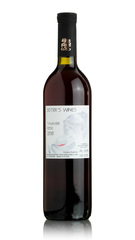Georgia: The Land of Wine

History
The history of the world’s greatest drink just keeps getting longer with evidence now showing winemaking happening in Georgia 8000 years ago. Known as the ‘Cradle of Wine’ Georgia can lay claim to be the ancestorial home of the UK’s most popular alcoholic drink and, along with neighbouring Armenia, Azerbaijan and eastern Turkey and nearby northern Iran, have helped develop this grape nectar alongside civilisation itself. This bares true a mere few thousand years later with wine being an integral part of the western classic civilisations of ancient Greece and Rome.
Was wine several thousand years ago really wine as we know it now though; wine that we can buy on the shelves? Well some of those traditional methods have survived though many of the varieties then have long since disappeared or evolved through centuries of mutations and crossings to the present day. The ancient way of making wine then, and which is still used today, is with qvevri. These are clay vessels buried in the ground where you would chuck in whole bunches of grapes and then seal allowing fermentation and maturation to take place. Sometimes just a clay trough covered with soil and then prised open for a feast etc. Today we would use the terms ‘authentic’ and ‘rustic’ to describe the results, though perhaps ‘rough’ might have been more appropriate on occasion. This method spread across the ancient world with the classical variant of qvevri being termed amphora in the Mediterranean region (though the Romans et. al. didn’t necessarily bury theirs).
Today
Today these truly authentic methods are still in use, though now there might be a selection of bunches pre-fermentation, maybe only partially whole bunch, sometimes fermented in one qvevri and then transferred to another, or perhaps just matured rather than fermented in them or vice versa. Along with much improved viticultural knowledge, modern wine making techniques and today’s varieties it can be said that while the qvevri wine you can buy now is not exactly the same as thousands of years ago it is a true evolution of it; it can trace its lineage back unbroken.While wine is grown all over Georgia (the Argonauts – because Georgia is also the land of the Golden Fleece – saw vines and fountains of wine in the west) it is to the east of capital Tibilisi that the main viticultural regions are, principally Kakheti which is home to over two thirds of Georgia’s vineyards. Moderate rainfall and hot summers along with a range of different soils means Kakheti can produce a number of different wines from indigenous grapes. While western varieties are grown in Georgia over 90% of wine produced is pleasingly made with native ones, the two most famous being white Rkatsiteli and red Saperavi . Other white varieties include Kisi , Krakhuna , Chinuri , various Mtsvanes (means new/young/green, so quite widely used), though with reds Saperavi has a bit of a monopoly but you will find the likes of Shavkapito (all 20 hectares of it), and Tavkveri (apparently the “shark of vines”…) hidden about the place.
It is brilliant that a country with such a long and proud wine producing heritage like Georgia, which is deeply woven into the nation and the beginnings of civilisation itself, one that is blessed with a large number of indigenous varieties, continues to produce the vast majority of its wine using these rather than succumb to the well-known international ones. It is also great to see the most ancient of techniques still in use today, both is some cases in the most traditional of ways and in others adapted to modern winemaking and the 21st century consumer’s palate. A country whose winemaking has survived ancient times and the changes of more recent ones. In the 18th century, pre the devasting phylloxera disease that wiped out much of the world’s vines in a matter of decades, Georgia had over 170,000 acres of vineyards, phylloxera reduced this to 100,000, it rose again in Soviet times to over 250,000, crashed again to 100,000 by the early 21st century and now is once again seeing a resurgence. Unbound by Soviet diktat the wine industry in Georgia, both the modern and the traditional, is flourishing with energy, enthusiasm and renewal and we are delighted to offer a selection of wines from across the range .












